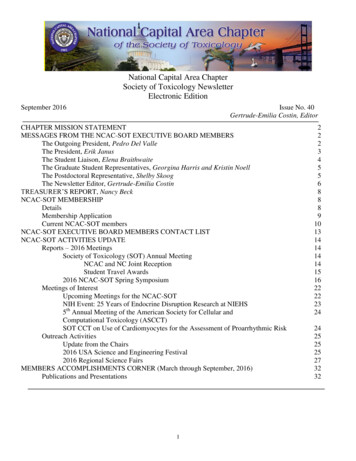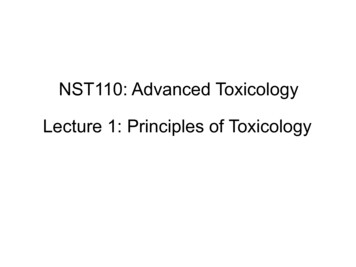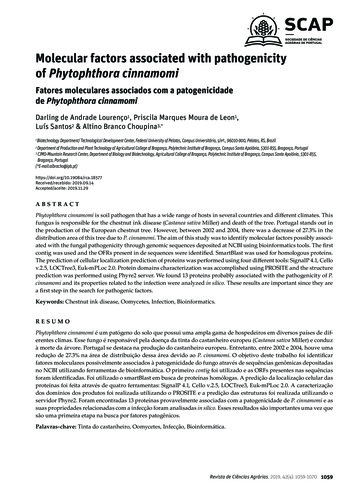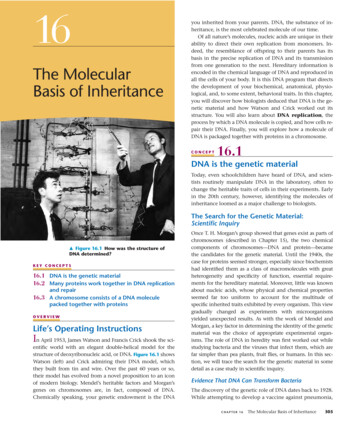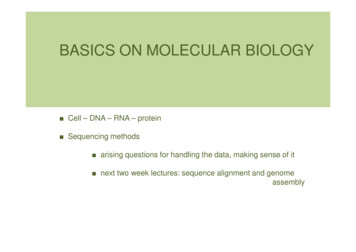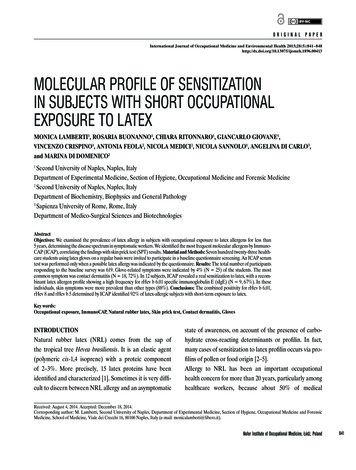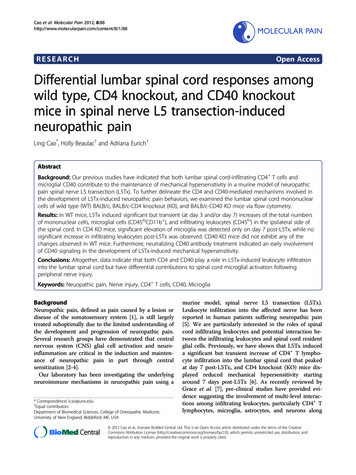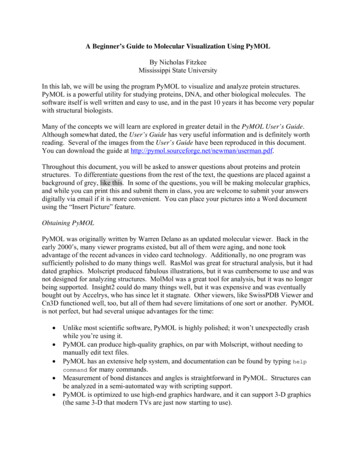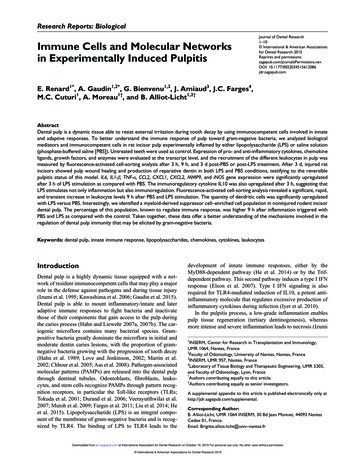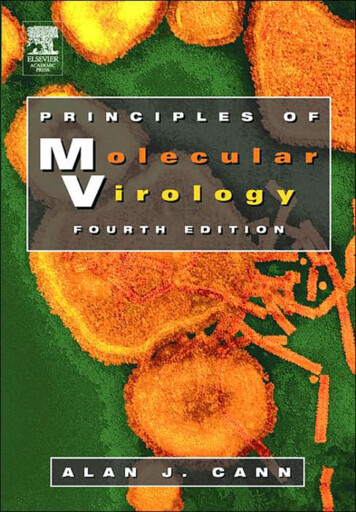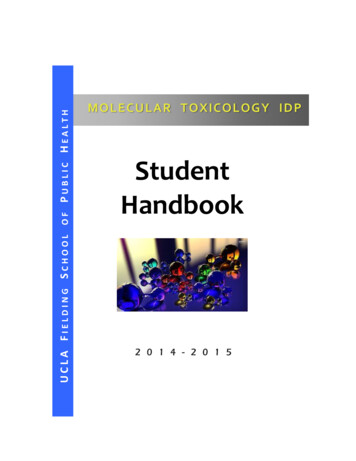
Transcription
UCLA FIELDING SCHOOL OF PUBLIC HEALTHMOLECULAR TOXICOLOGY IDPStudentHandbook2 0 1 4 - 2 0 1 5
Table of ContentsIntroduction . 4Scope & Objectives. 4Research . 4Career Opportunities . 4Financial Support and Funding . 4Academic Apprentice Personnel . 5Requirements for Fee Remissions . 5Academic Information . 7Admissions Requirements . 7Standards and Procedures for Graduate Study at UCLA . 7Doctoral Degree Program Requirements . 8Requirments for 1st Year Students . 8Requirements for 2nd Year Students . 9Requirements for 3rd, 4th, & 5th Year Students. 9Molecular Toxicology Internal Seminar Series (Mol Tox 211 A-C) . 9Research Credits . 10Representative Electives . 10Written and Oral Qualifying Exams . 10Nomination of Doctoral Committee . 11Oral Qualifying Exam . 12Advancement to Candidacy . 12Final Oral Examination . 12Required Forms & Timing . 12Student Affairs . 13Student Services/Advising . 13Official Materials from the University . 14Academic Course Load . 14Registration . 14Paying Fees . 15Filing Fee . 15Enrollment/MyUCLA . 16Enrollment Deadlines. 16Study List . 16Normal Progress/Full-time Graduate Program . 16Leave of Absence . 17Establishing California Residency . 17Data sheet . 18Grading . 18English as a Second Language . 18Academic Probation . 192
Student Complaints and Academic Grievances . 19Academic Dishonesty . 19Ordering Transcripts . 19Change of Name or Address . 20Student Life & Resources . 202014-15 Academic Calendar. 20BruinCard (Student ID). 21International Students . 22Student Mailboxes . 22Arthur Ashe Student Health and Wellness Center . 22Medical Insurance Requirement . 22Waiving SHIP . 22UCLA Counseling and Psychological Services . 23Graduate Writing Center . 23FSPH Career Services Office. 23UCLA Career Center . 23Bruin OnLine (BOL). 23BruinTech . 24Borrowing a CLICC Laptop . 24Office for Students with Disabilities (OSD) . 24Transportation & Shuttle Services . 24Molecular Toxicology IDP Course Descriptions . 25Molecular Toxicology IDP Faculty Research Interests . 283
Introduction:The thirty Faculty members of our interdepartmental program come from sixteendifferent departments in the School of Medicine, the School of Public Health and theCollege of Letters and Science at UCLA. Members of our faculty also participate in theactivities of the UCLA Jonsson Comprehensive Cancer Center, and the newly establishedCalifornia Nanosystems Institute. A major advantage of UCLA is that the above entitiesare all in close proximity to one another on campus, providing our students with a widerange of educational and research opportunities. Our students also participate in many ofthe activities of the other biomedical science doctoral programs at UCLA. Areas ofparticular strength in our program include chemical carcinogenesis, repair of DNAdamage, air pollution toxicology, nanotoxicology, and the environmental causation ofParkinson's disease. The program is supported by a training grant from the NationalInstitute of Environmental Health Sciences (NIEHS). Our program is now in its twelfthyear. Students from our first nine years (2001-2009) have all graduated.Scope & Objectives:The mission of the UCLA Molecular Toxicology Interdepartmental Program is to traindoctoral students to perform cutting edge research on the mechanisms wherebyexogenous chemical and physical agents cause disease.Research: Please see our website,http://www.ph.ucla.edu/moltox/faculty.php forinformation about research activities of our faculty,and other relevant information.Career Opportunities:All Molecular Toxicology students admitted in 2001 to2009 have graduated, attesting to the effectiveness ofour program at graduating students in a timely fashion. One of our graduates is anAssistant Professor at a major research university (Northwestern), twelve are pursuingpostdoctoral studies, eight are scientists in major biotechnology companies, and oneworks for the US FDA.Financial Support and Funding:The Molecular Toxicology IDP is responsible for providing the stipend and fees for allincoming students for the first nine months of their first year. Students will receive astipend agreed upon by all UCLA ACCESS participating departments (currently 31,000/year) plus fees. The Molecular Toxicology IDP payments for the first ninemonths will come from Graduate Division funds, the NIEHS training grant, and certainother funds. From month 10 onwards, the stipend and fees for each student are theresponsibility of the student’s thesis mentor, and will be obtained from training grants,teaching assistantships, grants to the mentor, and other sources.4
If during the first nine months, a student does not receive his/her monthly stipend, he/sheshould pursue the following process in an attempt to get the problem resolved.(i)He/she should first speak to the Mol Tox SAO (Rebecca Greenberg) toascertain whether a lack of payment is due to an administrative glitch.(ii)If this does not solve the problem he/she should discuss the matter withthe Molecular Toxicology Graduate Student Advisor (currently Professor.Michael Collins) and/or the Chair of Mol Tox (Professor OliverHankinson).(iii)If this does not solve the problem, he/she should go to the Chair of EHS(Professor Richard Jackson).Academic Apprentice Personnel:“Academic apprentice personnel” are academic student employees (Readers, Tutors, andTeaching Assistants) and Graduate Student Researchers (GSRs). These apprenticeshipsare intended to provide qualified students with relevant training experience for academicand academic-related careers in teaching and research and to augment limited resourcesfrom within the University for graduate student support. As a matter of University policy,academic apprentice personnel are considered primarily as students being professionallytrained, and graduate student status takes precedence over University employment.Many students obtain part time academic personnel positions as Special Readers,Teaching Assistants or Graduate Student Researchers with faculty either at the FieldingSchool of Public Health or elsewhere on campus. Students who are appointed toacademic personnel positions for at least 25% time and enrolled in a minimum of 12 unitsare eligible to receive fee remissions.Academic apprentice appointees are eligible for fee deferrals, medical insurance, feeremissions, and TA Advance Loan checks. For details on these benefits and policies onemployment, consult the Academic Apprentice Personnel Manual.Requirements for Fee Remissions:1. The following standards must be met in order for students to receive apprenticefee remissions: Students must register and enroll by the third week of the quarter(registration and enrollment must also be maintained throughout the quarter)2. Appointment(s) must total 25% time or more for the quarter3. Students must work hours equivalent to 25% time in apprentice titles in a givenquarter (usually 106‐110 hours)4. Students are expected to enroll in at least 12 units to receive health insurance andfee remissions.5. Students must maintain a 3.0 GPA to be appointed as an apprentice and may notwork more than 12 quarters as a TA or more than 18 quarters in all apprenticetitles combined.5
Graduate Students are allowed have a maximum of a 50% appointment on any givenquarter. Students receiving Special Graduate Division Fellowship Funding may havedifferent restrictions. Please check your award letter for restrictions.Working over 50% time:Graduate Students must have approval from the Department to work over 50% time.Students will need to coordinate with the Department Student Affairs Officer to file theappropriate paperwork. A letter of support from the Faculty Advisor is required to workover 65% time. Approval from the Graduate Division is required to work over 75% time.How to Find Appointments:1. Information on anticipated student employee openings by s.pdf2. Summer teaching assistant opportunities are available through Summer Sessions:www.summer.ucla.edu/planning/ase.htm3. Additional academic year and summer tutor opportunities are available throughthe College: www.college.ucla.edu/ase4. Graduate Student Researchers (GSRs): Begin inquiries about appointments wellbefore the beginning of the quarter. Ask faculty or staff about research projectsthat may need GSRs.**It is the student’s responsibility to inform the Department of any campuspositions that they have accepted and any funding that they are receiving. You mustprovide this information to the Department’s Student Affairs OfficerPlease click on links below for specific information: Support for Continuing StudentsBrochure & application forms. ASE Appointment OpportunitiesAnticipated student employee openings & union agreement. Summer Research MentorshipSummer support for doctoral students in the humanities & social sciences. Funding OpportunitiesExtramural support, online funding databases, & proposal consultants. Academic Apprentice PersonnelStudent manual & salary scales. Graduate Work-Study ProgramSupport for academic research projects. Bruin Direct DepositAuthorization form for direct deposit of stipend payments. Tax Information & FormsUCLA tax information and forms for fellowship recipients.6
Academic Information:Admissions Requirements:Applicants should have an excellent record, perform satisfactorily on the GraduateRecord Examination (GRE), have completed a minimum of a four-unit undergraduatecourse in statistics, and be acceptable to the admissions committee. Students who havenot completed a statistics course may do after being admitted.The ideal preparatory training is either a major in chemistry or biology and a solidbackground in both of these disciplines. Courses of value for toxicologists include thefollowing: calculus, statistics, cell biology, genetics, physiology, microbiology, molecularbiology, inorganic chemistry, organic chemistry, biochemistry, and physical chemistry.However, excellent students from all disciplines are considered for admission.In addition to the University's minimum requirements and those listed above, allapplicants are expected to submit the departmental application through the Schools ofPublic Health Application Service (SOPHAS).A master's degree is not a prerequisite for admission.For application materials, go to the Fielding School of Public Health Student Affairswebsite at: http://ph.ucla.edu/prospective-students.All application materials for the School’s graduate programs are available online forelectronic submission at www.gdnet.ucla.edu and at www.sophas.org. Students areadmitted in the Fall Quarter only.Standards and Procedures for Graduate Study at UCLA:General regulations concerning graduate courses, standards of scholarship,disqualifications, appeals, leaves of absence, normal progress toward degree, withdrawalsand other matters can be found at: mThe site also provides detailed information and sets forth general policies regarding7
completion of degree requirements, master's and doctoral committees, examinations andforeign language requirement.Doctoral Degree Program Requirements:Please refer to the UCLA General Catalog, and the Graduate Division website for moredetailed information regarding the degree requirements for the Ph.D. in MolecularToxicology.Time-to-Degree:The normative time for the degree is 15 quarters (five years). It is expected that requiredcoursework is completed within five quarters and the written and oral qualifyingexaminations are completed within six quarters (two years). Students who fail tocomplete the dissertation within 18 quarters are placed on probation within the program.Foreign Language Requirement: There is no foreign language requirement.Teaching Experience:All students obtain instruction in teaching skills by serving as teaching assistants orreaders for one quarter, typically one quarter during the second or third year. Exceptionsto the timing of teaching are considered by the program's Steering Committee.Course Requirements:Requirements for 1st Year Students:Fall & Winter: First year Molecular Toxicology students can either take: Biological Chemistry 254A & 254B in the fall and Biological Chemistry 254C &254D in the winterOR Molecular and Medical Pharmacology M252A & M252B (fall) and Molecular,Cellular and Integrative Physiology M262A & M262B (winter). Students shouldselect between these two series in consultation with their graduate advisor.Spring: First year Molecular Toxicology students take Environmental Health Sciences(EHS) C240 and Microbiology, Immunology and Molecular Genetics (MIMG) C234 inthe spring quarter.8
In all quarters of the first year students take a six-unit laboratory rotation (MolecularToxicology 596) with their Faculty sponsor. The basis of grading for this course (lettergrade or S/U) is determined by the advisor and should be discussed prior to enrolling.In addition all Molecular Toxicology students enroll in the internal seminar series (MolTox A, B, & C) every quarter. Your grade is these courses will not be available until youhave completed the last course in the series (211C) in the spring quarter.Requirements for 2nd Year Students:In the second year students take Molecular &Medical Pharmacology 237 in the fall quarter andEnvironmental Health Sciences M242 in thewinter (this course can be taken in the third year ifit is not offered in the second).Starting with the second year, students spend mostof their time on dissertation research. In additionto the course requirements listed here
Bruin Direct Deposit Authorization form for direct deposit of stipend payments. Tax Information & Forms UCLA tax information and forms for fellowship recipients. 7 Academic Information: Admissions Requirements: Applicants should have an
